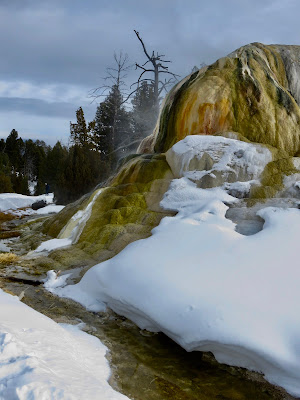All alone in one of our nation's most heavily visited national parks? Well, technically, no. But practically, yes. The section of Yellowstone between the northern entrance in Gardiner, Montana and the northeastern entrance in Cooke City, Montana is lightly visited during winter.
Trails and byways along the 56 mile road between the two towns are open to cross-country skiing, snowshoeing and hiking. What they are not open to is snowmobiling, resulting in blissful quiet and solitude.
The map below shows the locations of six trails Tim and I accessed on a recent trip to Yellowstone National Park. (Numbers and arrows in bold black.)
 |
| Click on map to enlarge. |
****
1. Mammoth Upper Terrace Loop Trail. This trail, just south of the town on Mammoth Hot Springs, leads to views of hot springs, travertine terraces, and the surrounding mountains.
What are travertine terraces? The following definition is from Wikipedia: "In Yellowstone, travertine results from a simple interaction of hot water, limestone, and a fault zone. The mineral-rich water then travels to the surface along a fault zone. Travertine terraces are some of the most bizarre-looking geological formations on Earth. The rock that makes up these unique formations is a type of limestone commonly deposited by mineral springs through a process of rapid precipitation of carbonate minerals.”
And there you have it, the reason we ski the travertine terraces loop every time we're in the park—to view these bizarre and beautiful formations without the crowds. We encountered six other people while skiing this loop.
 |
| The Upper Terraces Loop Trail winds around this travertine terrace formation. |
2. Blacktail Plateau Ski/Snowshoe Trail. This groomed 8 mile trail follows open meadows and then descends into a spruce-fir forest.
 |
| We traveled only a short distance in the open meadow. Tim snowshoed along the edge while I skied. **** |
3. Tower Fall Trail. This trail ascends a gradual slope to Tower Fall and Campground.
 |
| View from the Trout Lake Trail. |
 |
| Tim crosses a bridge at the west end of Trout Lake. **** |
5. Pebble Creek Box Canyon. This very short trail leads from Pebble Creek Campground (closed in winter) into a stunning box canyon.
 |
| We snowshoed into the canyon until a tangle of deadfall blocked our path. **** |
6. Barronette Trail. This trail, in the northeastern-most section of the park, is a 3.5 mile section of the Old Cooke City road. The trail lies mostly in conifer forests beneath Barronette Peak.
 |
| Orange blazes (tree on the right) mark this trail. |
 |
| View from the Barronette Trail. **** |
Do tourists visit Yellowstone in winter? Yes, they do. Snowmobilers and wildlife photographers "crowd" some sections of the park. Less popular are the trails through meadows and forests. Perhaps this post will inspire others to experience solitude while exploring Yellowstone's winter wonders.

